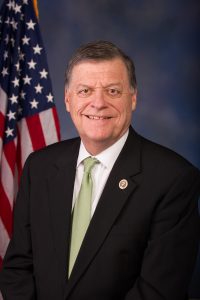 At a time when trust in government is at or near an all-time low, it is critical that Congress and the President do everything we can to ensure that American tax dollars are being well-spent.
At a time when trust in government is at or near an all-time low, it is critical that Congress and the President do everything we can to ensure that American tax dollars are being well-spent.
Take Social Security. Whether you are making minimum wage or earning a comfortable salary, 6.2 percent of your paycheck goes to fund this program. If you own your own business, the amount is actually double that because employers are legally required to match their employees’ contribution.
Unfortunately, this program – which is one of the most popular and successful in American history – is currently in critical danger. Since its creation in 1935, Social Security has been a reliable resource for retirees, and while the program was initially created to keep senior citizens out of poverty, Social Security now represents more than 50 percent of income for the typical retiree.
However, with the impending retirement of the largest generation in American history – the baby boomers – the amount of money being paid into Social Security will be rapidly overtaken by the amount being paid out. In order to protect and preserve this important social program – and restore public confidence that their tax dollars are being well spent — it is imperative that reforms are undertaken with all due haste. If we act now, no current retiree or near retiree will have to make any sacrifices, and the program will be there for our children and grandchildren. If we continue to procrastinate, neither of these will be true.
In 2014, the Social Security Trustees’ Report stated that unless action is taken soon, the Social Security Trust Fund will be exhausted by 2034. Since Social Security is self-financed through income tax revenues and interest, it has had a consistent source of funding that has allowed benefits to keep pace with inflation. In fact, for years, it has collected more revenue than was necessary to pay benefits, and allowed for creation of a Trust Fund that contains the surplus.
Whether you are making minimum wage or earning a comfortable salary, 6.2 percent of your paycheck goes to fund this program.
However, demographic changes since 2010 have seen Social Security expenditures rapidly expanding, and the Trust Fund will soon start to be depleted. Most Americans understand what that means in their own households. If your bills continue to increase while your income decreases, and you start spending your savings rather than reducing your bills, pretty soon you will have no savings, too little income, and you will not be able to pay your bills. Without significant reforms, there will come a time when Social Security will be unable to pay its beneficiaries.
There are a variety of ways to fix Social Security, and it will be far less painful to fix it now rather than if we continue to put it off. One option would be to raise the income level cap from $113,700 to $215,000. That alone would reduce the Social Security shortfall by nearly a third, and eliminating the cap altogether would reduce it by two thirds. Another option would be to reduce Social Security benefits from the top 25% of earners. Wealthier retirees have many other sources of income to supply their retirement. We should also consider gradually raising the retirement age. When Social Security was first initiated in 1935, the average life expectancy for a man was 61 years old. Today, a 65 year old man can expect to live 18 more years.
While policy options for saving Social Security are fairly simple and straight forward, the politics are anything but. In the past, elected officials and candidates for office were warned that Social Security was the “third rail” of politics. Touch it and you will die. Consequently, policy makers in both parties shirked their responsibility to rescue this invaluable program.
Fortunately that is beginning to change. Today, leaders in both parties are acknowledging the obvious – the real third rail is inaction and denial of the obvious. If nothing is done and Social Security fails, it will be those politicians who sought to make political points rather than constructively addressing the issue who will find themselves tossed from office.
Without significant reforms, there will come a time when Social Security will be unable to pay its beneficiaries.
That is why in the last Congress I teamed up with my Democratic colleague from Maryland, Congressman John Delaney, to create a reasonable first step to finding a bipartisan solution. Our bipartisan, bicameral legislation would guarantee the long-term solvency of Social Security.
Modeled on the 1983 Social Security Commission, this bill would create a commission that has the power to automatically produce an up or down vote in Congress. Named the ‘Commission on Long Term Social Security Solvency,’ it would be comprised of 13 members appointed by House and Senate leaders of both parties, as well as the President.
Within one year of their first meeting, the Commission must provide recommendations on how to save the program. These recommendations need to have a nine vote threshold in order to be presented to Congress, guaranteeing bipartisan consensus. Any recommendation from the Commission would be subject to an expedited up or down vote.
American families make common sense, yet difficult, decisions every day. They understand that those decisions may not be popular, and may involve sacrifice. But they respect one another for stepping up and doing what needs to be done. It’s time for our elected officials to lead on this issue with candor, compassion and courage.
Doing so will not only help protect and preserve Social Security for future generations of Americans, but will also send a message to Americans that their hard earned tax dollars are being well spent.
Tom Cole represents the 4th District of Oklahoma in the U.S. House of Representatives.




